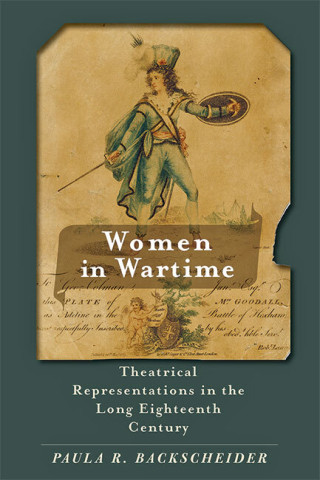
Reviews
Paula R. Backscheider, a significant writer on the subject of eighteenth-century drama...analyses more than fifty plays in a substantial work that she acknowldges took years to write.
Women in Wartime is masterfully written tying together theory, historical context and a vast body of evidence....Backscheider's work is relevant far beyond the eighteenth century; she identifies quintessential themes that continue to shape perceptions of gender in theatre and literature today, and perhaps most importantly, shows how intertheatricality can impact studies of theatre, gender, representation and reception.
Paula R. Backscheider offers an expansive prehistory of this familiar gendered and generational patriotism...There is much to appreciate in this study.
Particularly valuable among the critical pieces I have thus far discussed are those that contribute to the continued recovery and recentring of women's writing and women's representation in long eighteenth-century drama.... Prime among these is Paula R. Backscheider's Women in Wartime: Theatrical Representations in the Long Eighteenth Century, a tremendous undertaking that explores, as the title suggests, how the backdrop of 'intense periods of British wars' across the long eighteenth century affected playwrights' portrayals of female characters of all classes.
Women in Wartime is a deeply learned and informative book, bursting with detail and careful exposition of dozens of plays. Backscheider gives us a map and genealogy of the popular intervention theatre made in the public imagination of war and nation during the war-torn eighteenth century. Her performed, embodied, and visual sense of these theatrical experiences refuses to stay on the page.
Book Details
List of Illustrations
Acknowledgments
Abbreviations and Textual Note
Introduction
1. Prolegomenon. The Genesis of Wartime Women: Statira, Parisatis, and Roxana
2. The Changing Face of War: Fidelia, Mrs
List of Illustrations
Acknowledgments
Abbreviations and Textual Note
Introduction
1. Prolegomenon. The Genesis of Wartime Women: Statira, Parisatis, and Roxana
2. The Changing Face of War: Fidelia, Mrs. Gripe, and Clarinda
3. In the Shadow of Marlborough's War: Silvia, Rose, Belvedera, and Dorcas
4. Crisis Years: Women Must Say "Go"
5. From Props to Players: Nelly, Sukey, and Feridon
6. Marrying Military: Gendered Patriotism
Coda
Appendix A: Wars, Recruiting, and Women's Responsibilities and Rights
Appendix B: News
Notes
Bibliography
Index






